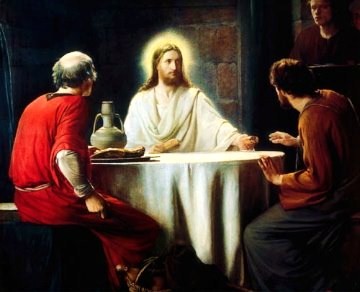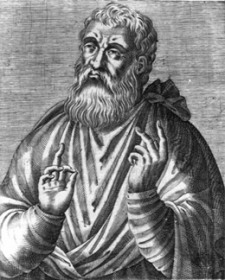| Back to Back Issues Page |
 |
|
Christian-History.org Ezine: The Great Commission and You February 07, 2010 |
The Emmaus RoadI have been remiss by not making this wonderful piece of information more available.
Dinner in Emmaus 
In luke 24:13-33 there's a story about Jesus appearing to two disciples immediately after the resurrection. They were on the road to a town called Emmaus, and Jesus walked with them all the way there. Along the way … … beginning at Moses and the prophets, he explained to them from all the Scriptures the things about himself. (v. 27) Have you ever wondered what he explained to them? I know I have. But after reading through the writings of the 2nd century churches, I think they knew what Jesus taught on the road to Emmaus. I think that not only did those disciples tell others what Jesus had said, but I think Jesus explained those things to the apostles as well. The reason I think those things is because the 2nd century churches saw a lot of prophecy in the Old Testament writings that we just don't see.
Interpreting the Old TestamentThere is a method of interpreting the Old Testament that was a given to both Christians and Jews. It was a figurative method, and you can see it employed throughout the New Testament.
Hebrews uses that method throughout, but Paul provides an excellent example with his exposition of Sarah and Hagar beginning in Galatians 4:21. Peter, too, employs this method in telling us that the flood was a type of baptism (1 Pet. 3:20-21). The ultimate collection of Old Testament prophecies of Christ is in Justin Martyr's Dialogue with Trypho, a Jew. In it, Justin is seeking to establish to a Jewish audience that everything about Jesus, all the way down to his crucifixion, is what was predicted by the Jewish Scriptures. He speaks with these Jews, Trypho being their lead speaker, about interpreting the Old Testament. What the prophets said and did they veiled by parables and types, as you admitted to us. As a result it is not easy for everyone to understand the majority [of what they said]. They concealed the truth in this way so that those who are eager to find out and learn it would only do so with much effort. (ch. 90) Is that a surprising description of the Old Testament prophecies of Christ? Not to the Jews with Trypho. Their only response was: Yes, we admitted this.
Moses Signifies the CrossWith that established, Justin Martyr then gives my favorite figurative prophecy of Jesus as the Christ. In future newsletters, we'll cover others in the order Justin covered them, but this one is so interesting, I can't wait to tell it to you.
Justin Martyr 
Keep in mind as you read the following that in Greek, Jesus and Joshua are exactly the same name. Even in Hebrew, they are much more similar to one another than they are in English. However, the New Testament and all the 2nd century Christian writings were written in Greek, where both names are spelled Iesous. So when you read "Jesus" here, remember that he's speaking of Joshua, the son of Nun/Nave. When the people … waged war with Amalek [Ex. 17:8ff], and the son of Nave, named Jesus, led the fight, Moses himself prayed to God, stretching out both hands. And Hur with Aaron supported [his hands] during the whole day, so that they might not hang down when he grew weary. For if he gave up any part of this sign, which was an imitation of the cross, the people were beaten … But if he remained in this form, Amalek was defeated, and he who prevailed did so by the cross. It was not because Moses prayed in this way that the people were stronger, but because he made the sign of the cross while one who bore the name of Jesus was in the forefront of the battle. (ibid.) In other words, when Aaron and Hur were holding up Moses' arms, and while Joshua—Jesus in Greek—was leading the armies of Israel, the Gospel was being prefigured in the events of that day. The Scriptures were prophesying both that the Christ, the deliverer of God's people, would be named Jesus, and that the means he would use to deliver us would be the cross, symbolized in Jesus' outstretched arms. This sort of figurative interpretation of the prophets was convincing to Justin's Jewish hearers. There are two reasons for this:
For example, the next one that Justin brought up (ch. 94) was the brass serpent made by Moses …
The Brass Serpent Signifies the CrossFor tell me, was it not God who commanded by Moses that no image or likeness of anything which was in heaven above or which was on the earth should be made, and yet who caused the brass serpent to be made by Moses in the wilderness? Wasn't it Moses who set it up for a sign by which those bitten by serpents were saved? Yet he is free from unrighteousness. Why indeed. The Jews with Trypho were moved. It was a legitimate request. God had forbidden that any image of anything in the sky, earth, or sea be made by the Jews, yet here was Moses making an image of a snake to heal those who were bitten by snakes due to a curse from God. Justin's answer made sense, though it once again, like the battle with the Amalekites, tied deliverance from the original snake, the devil, to the cross of Jesus Christ. That's not something the Jews liked to hear. But they could not deny it … You have spoken truly; we [Jews] cannot give a reason [that Moses was commanded to make an image]. For I have frequently interrogated the teachers about this matter, and none of them gave me a reason. Therefore, continue what you are saying, for we are paying attention while you unfold the mystery, on account of which the doctrines of the prophets are falsely slandered. (ch. 94) Awesome, isn't it? Let's look at one more, but then this newsletter will be too long, and we'll have to wait till next month to do some more. I think these are awesome, and even more, Jesus himself thought these things were important enough to be the subject of his first long discussion after he rose from the dead. How's that for being let in on a great secret!
Genesis 49:10-11: The Blood of the GrapeThere is a difference between the Old Testament used by the early Christians and the one we use. They used an Old Testament known today as the Septuagint or LXX. It was a Greek translation of the Hebrew Scriptures. Although it's Greek rather than the original Hebrew, the oldest Septuagint texts are almost a thousand years older than the oldest Hebrew texts that we have. So even though it's a translation, it represents an older text. This, by the way, is the reason that you can look up New Testament quotes of the Old Testament and find them so much different. It's not that the New Testament authors didn't quote well; it's that they were often using an Old Testament with different wording. In Matthew 4:10, for example, Jesus' quote of Deuteronomy 6:13 is word for word from the Septuagint, while one of the phrases is missing in our modern Masoretic text translation. In most instances, this doesn't matter much, but there are some prophecies that are a lot clearer in the LXX. Justin Martyr said it was because the Jews were trying to change the Scriptures where they clearly testified of Christ. Let's hope he was wrong. Either way, our Old Testament and that of the early Christians agree on Genesis 49:10-11: The scepter shall not depart from Judah, nor a lawgiver from between his feet, until Shiloh come, and the people shall give their obedience to him. Tying his foal to the vine, and his donkey's colt to the choice vine, he washed his garments in wine, and his clothes in the blood of grapes. Here is Justin's exposition of that passage in a different writing, his First Apology: Up to the time of Jesus Christ, who taught us, and interpreted the prophecies which were not yet understood, [the Jews had a lawgiver] as was foretold by the holy and divine Spirit of prophecy through Moses, "that a ruler would not fail the Jews until He should come for whom the kingdom was reserved" … After [Jesus Christ] appeared, you [the Roman emperor] began to rule the Jews and gained possession of all their territory. (ch. 32) The Jews had their own ruler until after Christ came, when Rome destroyed Jerusalem and drove the Jews from Israel in A.D. 70. God had fulfilled this first part of the prophecy by letting Judah always have a scepter until "Shiloh come." Justin then goes on to point out that Christ has followers in all the nations. In the LXX, the next phrase, rather than being "the people shall give their obedience to him," is, "he shall be the expectation of the nations." So Jesus had fulfilled that prophecy, too. (It applies well even in our Masoretic version.)
Washing in Wine and the Blood of the GrapeIt is astonishing that we don't devote more attention ourselves to Genesis 49:11. Who washes their garments in wine, or their robes in "the blood of grapes"? You wash clothes in water if you want to clean them. No one washes them in grape juice. So obviously, this verse is saying something other than what's on the surface. Let's let Justin explain it to us: And the prophecy, "tying his foal to the vine, and washing His robe in the blood of the grape," was a symbol signifying the things that were to happen to Christ and of what he was to do. For the foal of a donkey stood tied to a vine at the entrance of a village … and when it was brought, he … entered Jerusalem, where the vast temple of the Jews was, which was afterwards destroyed by you. Okay, we can understand all this. We might even have figured this out ourselves. But the early church had been prepared by Jesus and the apostles to peer much deeper into prophetic truth than we are able to. Justin is not yet done! For as man did not make the blood of the vine, but God, so it was hereby intimated that the blood should not be of human seed, but of divine power. … For by the power of God he was conceived by a virgin of the seed of Jacob, who was the father of Judah, who, as we have shown, was the father of the Jews. (ibid.) So this passage testifies of the virgin birth! Would you have gotten that out of it? I don't believe this kind of insight is stretching the Scriptures. The more the apostles and the Christians raised up in their churches explained the prophecies of the Old Testament in this way, the more those prophecies raveled themselves together like vines growing into an impenetrable wall. We would do well to mimic them and to share in the excitement fostered by the amazing consistency found in the Hebrew prophets. Truly the Word of God is something wonderful.
Thank you for making Christian History for Everyman such a success!Please pass this newsletter on to friends who may be interested. They can sign up at: https://www.christian-history.org/early-church-history-newsletter.html. Rose Creek Village Ministries is doing amazing things that I don't mind asking for help with. Please consider helping us change lives in Africa: "He that gives to the poor lends to the Lord, and he will repay his gift" (Prov. 19:17). Rose Creek Village Ministries, Inc. is a 501(c)3 tax-exempt organization, and donations to it are tax-deductible. |
| Back to Back Issues Page |